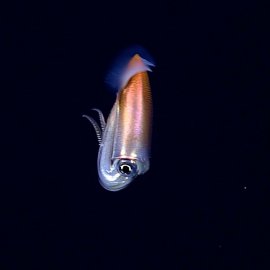Ocean Literacy: The Ocean is Largely Unexplored
-
English
-
ListenPause
[intro music] Welcome to World Ocean Radio… I’m Peter Neill, Director of the World Ocean Observatory. We are discussing the underlying principles of Ocean Literacy. Here is a final premise on which a new understanding of and curriculum for the ocean can be based: The ocean is largely unexplored. No one argues this point with such authority as Edward O. Wilson, university research professor emeritus and an honorary curator of entomology at Harvard, who, in a recent opinion in the NY Times entitled “The 8 Million Species We Don’t Know,” writes, “The most striking fact about the living environment may be how little we know about it. Even the number of living species can be only roughly calculated. A widely accepted estimate by scientists puts the number at about 10 million. In contrast, those formally described, classified and given two-part Latinized names (Homo sapiens for humans, for example) number slightly more than two million. With only about 20 percent of its species known and 80 percent undiscovered, it is fair to call Earth a little-known planet…” To preserve these organisms, Wilson and other conservation scientists propose to keep half the land and half the sea of the planet as wild and protected from human intervention or activity. Called “The Half-Earth Project,” the argue for conservation of places chosen by three main criteria: ‘First, areas judged best in number and rareness of species by experienced field biologists; second, “hot spots,” localities known to support a large number of species of a specific favored group such as birds and trees; and third, broad-brush areas delineated by geography and vegetation, called eco-regions.” These, applied to the ocean, underscore the efforts by governments and ocean advocates to designate marine protected areas around the world as reserves to protect the natural biodiversity from further destruction human intervention and exploitation. Associated tactics such a marine zoning are corollary to this effort, by additional designation of remaining areas to restrict specific enterprise such as industrial fishing, limited shipping routes, prohibited waste disposal, and all the other activities that occur on the ocean as a result of destructive behaviors on land. Wilson continues, “In the sea and along its shores swarm organisms of the other living world — marine diatoms, crustaceans, ascidians, sea hares, corals, loriciferans and on through the still mostly unfilled encyclopedia of life.” And he concludes, “With new information technology and rapid genome mapping now available to us, the discovery of Earth’s species can now be sped up exponentially. We can use satellite imagery, species distribution analysis and other novel tools to create a new understanding of what we must do to care for our planet.” So where and how are we looking? Research vessels, fixed observation systems, autonomous vehicle on the surface, in the water column, and on the ocean floor. Ice cores, hydrothermal vents, coral reefs – all these “ocean” places contain evidence of past and present life with enormous implication for future life in the form of news species discoveries, medicines synthesized from marine organisms, mimicry of ocean processes, and more complete knowledge of what surely is the last great wilderness where Nature still exists to support life in all it forms, now and to come. Ocean literacy comprises principles and awareness that will inform our world. We cannot be truly educated without it, reliant on only half of Earth’s supporting assets. We can also learn from what has gone before: the exhaustion by indiscriminate use of the land, the corruption of the air, and the already evident compromise that may delimit the essential value of the freshwater/ocean continuum. To be literate means to know the history and to learn from it; to see the reality and challenges of the present; and to engage in the pursuit of knowledge – in the vast ocean world – on which our future will depend. We will discuss these issues, and more, in future editions of World Ocean Radio. [outro music]
"The ocean is largely unexplored." So states the seventh and final Ocean Literacy principle, a series of fundamental concepts to help us better understand the ocean's influence on us and our influence on the ocean. World Ocean Radio's Ocean Literacy series continues this week with a discussion about how little we know about the ocean, and the need to designate vast marine protected areas around the world in order to protect the planet's natural biodiversity (known and unknown) from further destruction. This episode is part eight of a nine-part series on Ocean Literacy, an anthology of reflections, examples and illustrations that represent responses to the ocean and the environmental challenges we face.
About World Ocean Radio
Peter Neill, Director of the World Ocean Observatory and host of World Ocean Radio, provides coverage of a broad spectrum of ocean issues from science and education to advocacy and exemplary projects. World Ocean Radio, a project of the World Ocean Observatory, is a weekly series of five-minute audio essays available for syndicated use at no cost by college and community radio stations worldwide.
Resources
- Ocean Literacy Curriculum
- About the Ocean Literacy Principles
Image
Deep ocean research off the Western Coast of Hawaii: the first time this species of squid was spotted in its natural habitat
Credit: NOAA Okeanos Explorer
- Login to post comments



